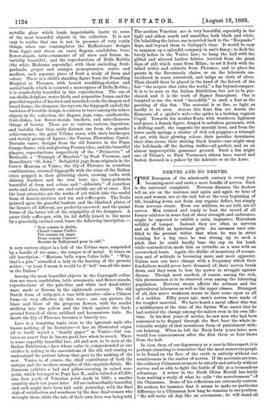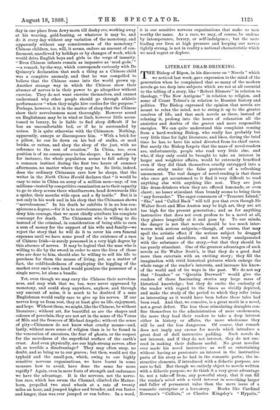NERVES AND NO NERVES.
THE European of the nineteenth century is every year becoming more and more a mere bundle of nerves. Such is the universal complaint. Nervous diseases, the doctors tell us, are on the increase, and again and again we hear of men and women, not at the end, but at the very beginning of life, breaking down, not from any organic defect, but simply from nervous strain. Even our athletes, we are told, are all nerves. Men trained and ready to beat the record of all former athletes in some feat of sheer strength and endurance, might be expected to exhibit a calm, impassive, Herculean solidity of temper. Instead, they are often as nervous and as fretful as hysterical girls. An oarsman once con- fided to the present writer that when he was in strict training for a big race, he was strung up to such a pitch that he could hardly bear the cap on his head, while contradiction made him as irritable as a man with an overworked brain. Again, the dislike of monotony of occupa- tion and of solitude is becoming more and more apparent. Unless men can have change with a frequency which their forefathers would never have dreamed of, their nerves break down, and they seem to lose the power to struggle against disease. Though most marked, of course, among the rich, this phenomenon is to be observed even among the labouring population. Nervous strain affects the artisans and the agricultural labourers as well as the upper classes. Strangest of all, this nerve weakness seems to have come upon us all of a sudden. Fifty years ago, men's nerves were made of far tougher material. We have heard a naval officer who was a midshipman at the time of the Syrian War, assert that he had noticed the change among the sailors even in his own life- time. In his first years of service, he saw men who had been sentenced to be flogged through the fleet bear the whole in- tolerable weight of that monstrous form of punishment with- out fainting. When he left the Navy forty years later, men would lose consciousness after the first three or four blows from the lash.
In view, then, of our degeneracy as a race in this respect, it is perhaps consoling to remember that the most numerous people to be found ton the face of the earth is entirely without our sensitiveness in the matter of nerves. If the accounts are true, the ordinary Chinaman seems to be utterly and entirely without nerves, and so able to fight the battle of life at a tremendous advantage. A writer in the North China Herald has lately been making a study of what he calls "the nervelessness" of the Chinaman. Some of his reflections are extremely curious. He notices, for instance, that it seems to make no particular difference to a Chinaman how long he remains in one position. "He will write all day, like an automaton ; he will stand all
day in one place from dewy morn till dusky eve, working away at his weaving, gold-beating, or whatever it may be, and do it every day without any variation of the monotony, and apparently without any consciousness of the monotony." Chinese children, too, will, it seems, endure an amount of con- finement, unrelieved by holidays or by changes of work, which would drive English boys and girls to the verge of insanity. ' Even Chinese infanta remain as impassive as mud gods,'" —a remark, by-the-way, which corresponds curiously with De Quincey's declaration that such a thing as a Chinese child -was a complete anomaly, and that he was compelled to believe that the Chinese came into the world grown up. Another strange way in which the Chinese show their absence of nerves is in their power to go altogether without -exercise. They do not want exercise themselves, and cannot understand why other people should go through athletic performances "when they might hire coolies for the purpose." Perhaps, however, it is in the matter of sleep that the Chinese show their nervelessness most thoroughly. However sound an Englishman may be in wind or limb, however little accus- tomed to luxury, he is liable to find sleep difficult if he has an uncomfortable bed, or if he is surrounded by noises. It is quite otherwise with the Chinamen. Nothing, apparently, annoys or discomposes him. "With a brick for a pillow, he can lie down on his bed of stalks, or mud bricks, or rattan, and sleep the sleep of the just, with no reference to the rest of creation." In China, too, even position is of no consequence to the sleeper. In some places, for instance, the whole population seems to fall asleep by It common instinct during the first two hours of summer afternoons, no matter where they may be. So little, indeed, does the ordinary Chinaman care how he Bleeps, that the writer in the North China Herald declares that "it would be easy to raise in China an army of a million men—nay, of ten 'millions—tested by competitive examination as to their capacity to go to sleep across three wheelbarrows, head downwards like a spider, their mouths wide open and a fly inside." But it is not only in his work and in his sleep that the Chinaman shows " nervelessness." In his death he exhibits it in no less con- spicuous a degree,—for it is to nervelessness, though we do not deny him corn-age, that we must chiefly attribute his complete contempt for death. The Chinaman who is willing to die instead of the criminal, in consideration of being able to earn a sum of money for the support of his wife and family—we reject the story that he will do it to cover his own funeral expenses until we have some proof of the existence of a race of Chinese Irish—is surely possessed in a very high degree by this absence of nerves. It may be logical that the man who is willing to die by the sword in order to save the lives of those who are dear to him, should also be willing to sell his life to purchase for them the means of living, yet, as a matter of fact, the coldbloodedness of employing the higgling of the market over one's own head would paralyse the possessor of a single nerve, let alone a bundle.
Yet, even though we may envy the Chinese their nerveless- ness, and may wish that we, too, were never oppressed by monotony, and could sleep anywhere, anyhow, and through any amount of noise, it is much to be doubted if a sane Englishman would really care to give up his nerves. If our nerves keep us from rest, they at least give us life, enjoyment, and hope. Without them, we might, like the Chinese, be without literature ; without art, for beautiful as are the shapes and colours of porcelain, they are not art in the sense of the Venus of Milo and the frescoes of Michael Angelo ; without the sense of pity—Chinamen do not know what cruelty means—and, lastly, without more sense of religion than is to be found in the veneration of ancestors, the fear of ghosts, or the respect for the sacredness of the superficial surface of the earth's crust. And even physically, are our high-strung nerves, after all, so terrible a disadvantage P They may often snap, no doubt, and so bring us to our graves ; but then, would not the typhoid and the small-pox, which, owing to our highly sensitive nervous organisations, we have learnt in some measure how to avoid, have done the same far more rapidly ? Again, even in mere feats of strength and endurance we have the advantage. It is the nervous, not the nerve- less race, which has swum the Channel, climbed_the Matter- horn, propelled two steel wheels at a rate of twenty miles an hour, and jumped higher and broader, and ran faster and longer, than was ever jumped or run before. In a word, it is our sensitive nervous organisations that make us men worthy the name. As a race, we may, of course, be undone by intemperance, luxury, or self-indulgence; but the mere leading our lives at high pressure and keeping our nerves tightly strung, is not in reality a national characteristic which we need regret or deplore.



































 Previous page
Previous page